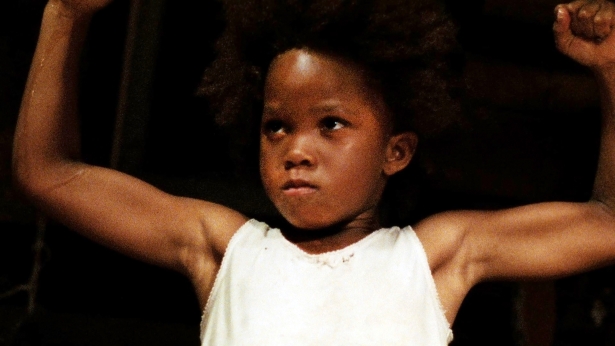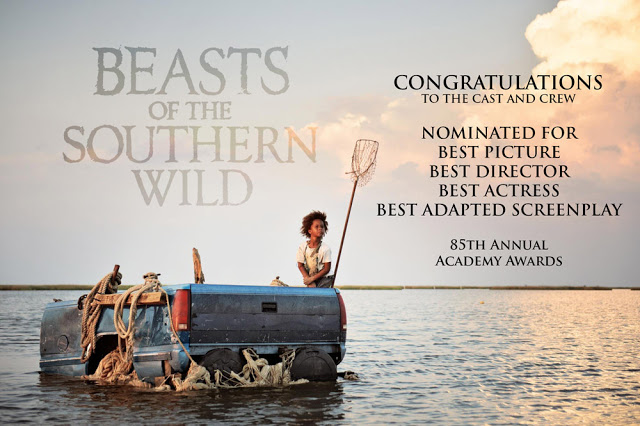Written by Max Thornton.
In my studies, I work with the intersection of pop culture and religion. This is a frustrating field: a lot of the discourse from the theological side is exceedingly shallow, and the explicit pop-culture engagements with religion are rarely any better.
Honestly, I often find I can have the richest theological dialogue with popular culture that is not explicitly religious, and Beasts of the Southern Wild is a superb example.
It is, of course, religious in the broad twentieth-century existential sense of “ultimate concern” and “meaning-making.” The film tackles Big Themes of loss, belonging, growing up, but it does so through a very specific story – that of six-year-old Hushpuppy, living with her difficult father in an imperiled swampland community called the Bathtub.
Quvenzhané Wallis is astonishing as Hushpuppy. I own T-shirts older than this girl, but she knocked my socks off and I hope she wins a billion Oscars. Like the film itself, she had to pull off a delicate balancing of the cosmic and the intimate. As the cinematography veers between wide sweeps of polar ice caps and close, intense shots of life in the Bathtub, so Wallis seemingly effortlessly manages both the very embodied work of near-wordless acting and the lyrical voiceovers that punctuate the film. With lines like “The whole universe depends on everything fitting together just right. If one piece busts, even the smallest piece, the entire universe will get busted,” Beasts of the Southern Wild reminds me a little of Terrence Malick’s The Tree of Life, but whereas that film bored me rigid, Beasts moved me to tears.
 |
| Or, to express that in Internet… |
Part of that dynamic is simply that both films exist in an entertainment culture overwhelmingly dominated by white middle-class people. Before The Tree of Life ever came out, I had reached a point where if I never again in my life saw another piece of entertainment about a white suburban family, it would be too soon. A film about a poor, largely African-American community in a Louisiana bayou automatically grabs my attention to a much greater degree (and, let’s be perfectly honest, the fact that it’s 45 minutes shorter than Malick’s endless bloody movie doesn’t hurt).
Interestingly, the film was initially a play about a father and son. Writer Lucy Alibar’s initial choice to distance herself from the young character through the gender-flip is reversed for the screen, and she is not unaware of the politics of gender:
“We made a hero story with a little girl in it, and she is fighting for her family, not her boyfriend. I never saw that growing up, I thought I had to be a little boy to be a hero.” (BlackBook interview)
“I always felt like there wasn’t a blueprint for father daughter relationships — for them or for us. Because what are they supposed to do with us, treat us like boys, or small women, or what? Father daughter relationships are so unique from family to family, and I’d love to watch it explored more onstage.” (Barnes & Noble interview)
Suddenly it makes sense that Hushpuppy’s father encourages her to be “a man”: it’s the only way of relating that he knows. He simply has no other way of expressing his feelings or his hopes for his young daughter.
 |
| Hushpuppy, being a man. |
The film beautifully navigates the relationship between independence and interdependence. From the very beginning, where Hushpuppy and her father live in separate but adjacent tiny houses, the six-year-old is never babied or coddled in any way; and yet she consistently stresses her understanding of the world and her place in it. She has a remarkably holistic idea of the cosmos, completely lacking in anthropocentrism – her description of a hospital: “When an animal gets sick here, they plug it into the wall” – and astounding in its sense of perspective.
Although the film itself doesn’t directly address the concept of God, it is pervaded with a religious sense. Lucy Alibar again:
“God isn’t this distant thing. God is right here with you all the time. He’s your buddy, and you can talk about everything. And writing this play and working on the film, seeing it, I felt God’s presence. I just had more of a sense of my place in the whole scope of everything.” (Elle interview)
Alibar’s triumph is that the film perfectly walks the line of contradictory impulses, affirming the individual’s “place in the whole scope of everything” without being deterministic, stressing the need to (as Hushpuppy’s teacher puts it) “take care of those smaller and sweeter than you” without being paternalistic, portraying an aching realism through a fantastical story of long-dead beasts. Cinema’s triumph is the emergence of an amazing young talent in QuvenzhanéWallis.
 |
| “I see that I’m a little piece in a big, big universe. And that makes things right.” |
Max Thornton blogs at Gay Christian Geek, tumbles as trans substantial, and is slowly learning to twitter at @RainicornMax.


I was crying throughout this movie and I’m not even sure why. I need to see this film again.